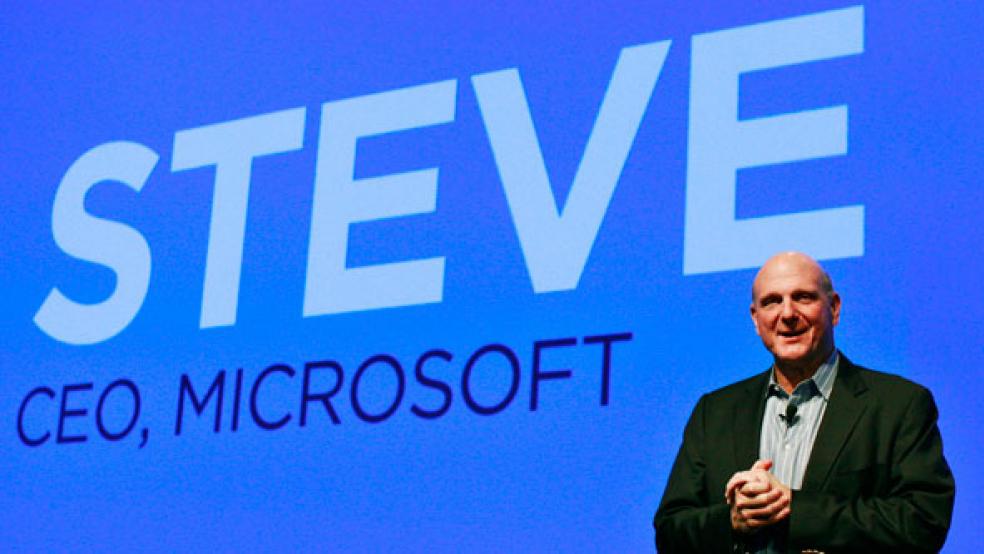If you own a working television set and haven’t yet cut the cord to your cable box, chances are that you’ve seen ads – lots and lots of ads – for Microsoft’s Surface tablet and its new Outlook.com email service. The extensive (and expensive) marketing push is part of a shift by Microsoft (NASDAQ: MSFT) toward being what CEO Steve Ballmer has described as a “devices and services company.”
As consumers increasingly turn to smartphones, tablets and – whether they know it or not – cloud-based services, the PC industry has been in a prolonged death spiral, forcing players like Microsoft, Hewlett-Packard (NYSE: HPQ) and Dell (NASDAQ: DELL) to reimagine their core businesses. Microsoft has thus far been able to weather the disruptions well – it generated record revenue of $21.5 billion in the last three months of 2012, and next week we’ll find out about the first quarter of 2013 – but the latest tracking reports on personal computer shipments show that the PC industry’s death spiral appears to have sped up.
The PC sales data released Wednesday included a double dose of bad news for Microsoft. Not only are overall PC shipments flagging in the face of competition from mobile devices – areas in which the software giant has thus far lagged the competition – but the company’s Windows 8 operating system has dramatically failed to reboot the crashing computer industry. Worldwide personal computer shipments, expected to drop 7.7 percent in the first quarter of 2013, instead plunged 13.9 percent compared to the same period last year, according to tracking firm IDC. It was the worst slide since IDC started its quarterly tracking in 1994.
Even as the economy has shown some signs of improvement, year-over-year PC shipments have been declining for four quarters in a row, according to IDC. PC shipments have fallen from 88.6 million in the first quarter of 2012 to 76.3 million in the first three months of this year. The trend for PCs, as seen in this IDC chart, is not pretty:
Windows 8, meanwhile, hasn’t won over consumers since being launched in October, accelerating the popular shift away from PCs. Microsoft looks to have a flop on its hands – and one that, despite Ballmer’s talk of devices and services, remains very much at the heart of the company’s strategy. "At this point, unfortunately, it seems clear that the Windows 8 launch not only failed to provide a positive boost to the PC market, but appears to have slowed the market," IDC’s Bob O'Donnell said in releasing the quarterly data. IDC’s data doesn’t include tablets or the new wave of laptop-tablet hybrids, so the slump in Windows-based computing may be slightly less pronounced than its figures show, but rival tracking firm Gartner found an 11.2 percent decline in year-over-year PC shipments so Windows 8 clearly hasn’t helped turn the tide.
The new operating system, designed to enable touch screens, has failed to win over users accustomed to the old user interface, or UI. Plus, PCs with touchscreens are still expensive compared to tablets. "While some consumers appreciate the new form factors and touch capabilities of Windows 8, the radical changes to the UI, removal of the familiar Start button, and the costs associated with touch have made PCs a less attractive alternative to dedicated tablets and other competitive devices,” O’Donnell said. “Microsoft will have to make some very tough decisions moving forward if it wants to help reinvigorate the PC market."
Microsoft is developing an updated version of Windows 8 for later this year and is adopting a faster update cycle in conjunction with the broader shift in strategy, but the worsening industry trends prompted Goldman Sachs analyst Heather Bellini to downgrade her rating on Microsoft’s stock to a “Sell” Thursday. “Our Sell thesis is based on our view that the company faces critical secular challenges given the deteriorating PC demand backdrop,” Bellini wrote.
She also outlined four “Plan B” stock-boosting strategies that the company could pursue if its Windows 8 push doesn’t gain traction over the next year or two. Among the options considered: breaking up the company or cutting prices to drive adoption of the Surface and other devices. “In our view Microsoft likely needs to adjust the price points of its Surface offerings to see material adoption, in particular in the consumer market,” Bellini wrote.
While Ballmer looks to turn Windows 8 into a success and turn the company into a stronger force beyond software, PC makers are left struggling to reinvent their businesses, too. Hewlett-Packard, the top PC maker, saw shipments fall 23 percent in the first quarter from the prior year, with what IDC described as “significant declines across all regions.” Dell’s shipments fell more than 10 percent worldwide and 14 percent in the U.S. Acer shipments plunged 31 percent. Lenovo, second to HP in shipments, has managed to avoid those declines, according to both IDC and Gartner. The two tracking firms reported very different results for Apple, with IDC tallying a 7.5 percent decline from the first quarter of 2012 and Gartner showing a similar-sized increase in shipments.
Apple at least has a bona fide hit in the world of mobile computing with its iPad (and iPad mini). Other industry players, Microsoft included, are still trying to figure out how to avoid the blue screen of death when it comes to personal computing.





